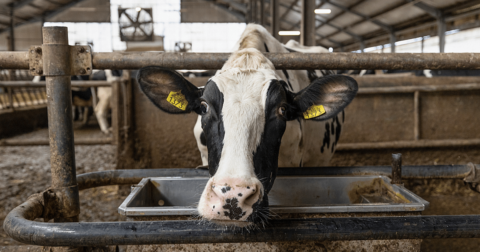Solutions
How Ecotourism Became an Unexpected Climate Solution in an At-Risk Guatemalan National Park
Climate•3 min read
Reported
A new investment report finds companies like Hormel and JBS are driving global greenhouse gas emissions in the wrong direction.


Words by Sophie Kevany
Emissions from the world’s top 20 meat and dairy producers have increased by an average of over 3 percent compared to a year ago, according to a new analysis from the investment risk research group FAIRR. Some of the worst offenders include U.S.-based Hormel Foods, whose emissions rose over 62 percent, and Brazilian beef giant JBS, which emitted almost four million metric tons of CO2 equivalent.
The investment risk research group’s mission is to “build a global network of investors who are aware of the issues linked to intensive animal production and seek to minimize the risks within the broader food system.”
What’s worrying about this year in particular, says FAIRR senior manager Thalia Vounaki, is “the sector as a whole is not on track to align with a 1.5 degree pathway,” referring to the goal for limiting global warming to avoid the worst effects of climate change.
Climate pollution from food accounts for more than a quarter of all greenhouse gas emissions, and the leading driver of all agricultural emissions is livestock production. In fact, meat and dairy farming is responsible for between 10 and 20 percent of all greenhouse gas emissions. On top of the climate cost of meat and milk, factory farming is also polluting waterways, driving antibiotic resistance, human disease outbreaks and uses almost 80 percent of the world’s arable land to produce less than 20 percent of all calories.
This year’s report, which is FAIRR’s sixth, shows that only seven of the 20 companies reviewed have managed to reduce climate emissions, despite recommendations made by the UN’s Intergovernmental Panel on Climate Change to reduce emissions from meat in order to stop the worst effects of climate change.
JBS is the largest emitter on the FAIRR index. Their 6 percent increase represents 3.8 million metric tons of CO2 equivalent, or almost 850,000 gasoline cars driven for one year. The company’s position as the largest emitter is, said Vounaki in an email, “a reflection of its production and the type of protein (beef) that it produces.” Beef is one of the most climate-intensive foods, according to the World Resources Institute. Vounaki noted that JBS is one of the companies on the index “that undertook an acquisition in this period which may have impacted their emissions.”
Hormel’s 62 percent jump represents almost 456,000 metric tons of carbon dioxide, or the equivalent of about 100,000 cars on the road for one year. Last month Hormel said it will make a 50 percent cut to its absolute emissions by 2030 but so far it is headed in the wrong direction. Hormel’s scope 1 emissions “went up considerably, however we could not find explanations by the company,” says Vounaki. Although, “it is possible that their acquisitions of Planters and Sadlers Smokehouse might explain this.”
Some companies did manage to reduce their climate impact, including Tyson Foods, down about 0.5 percent and Danone, down about 2 percent.
There are other signs of progress, according to the report. Forty percent of the 20 companies now publicly report scope 3 or indirect emissions created along their supply chains, which includes climate pollution from feed crop production and fertilizer use. In other positive news, Tyson Foods reported its scope 3 emissions for the first time this year, according to FAIRR’s analysis.
The authors of the report also praised Danone for committing to a 30 percent reduction in its absolute methane emissions from fresh milk by 2030, a bid to meet global methane pledge targets. Yet some climate experts have pointed out that the global dairy giant is relying on ‘techno-fixes’ rather than making any apparent attempt to reduce the number of dairy cows on farms that supply milk.
Danone does offer some plant-based products, though FAIRR’s Vounaki can’t say whether those alternatives explain the company’s 2 percent reduction — as plant-based foods make up just “9.5 percent of their sales,” said the researcher in an email.
The FAIRR emission index is based on the latest available data disclosed by the 20 companies between April and August 2023 this year. FAIRR is in direct contact with the companies included in the index, and has shown company representatives its emissions analysis data.
“The failure of leading meat and dairy companies to reduce emissions underlines the urgent need for more policy focus on the food and agriculture sector,” says Jeremy Coller, founder of FAIRR.
Hormel Foods, JBS and Tyson did not initially respond to Sentient Media’s request for comment.
Update: a representative for JBS has now responded that “JBS published its 2022 Sustainability Report, detailing the company’s updated 2022 GHG emissions inventory and a 9 percent reduction in scope 1 and 2 emissions from 2021 to 2022″ on August 31, 2023, too late to be included in this year’s index.
After publication of this story, a representative for Hormel Foods objected to the FAIRR analysis in this story in an email to Sentient Media, calling the 62 percent increase in emissions “not accurate,” pointing to its own calculations in its 2022 Global Impact Report and CDP Report.